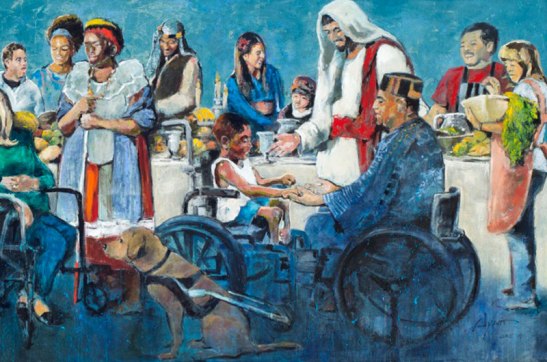Daniel Comboni
Comboni Missionaries
Institutional area
Other links
Newsletter
Jesus knew how much tension would arise among his disciples because of the frenzy for the top places. For that matter, at the Last Supper, he recalled once more the lesson. He wanted this to remain etched in everyone’s mind as his testament: “For who is the greatest, he who sits at the table or he who serves? He who is seated, isn’t it? Yet I am among you as the one who serves” (Lk 22:26-27).
Luke 14:1.7-14
It’s possible to experience God’s joy
by Fernando Armellini
Introduction
We are in a country villa of the upper class of a big city of the Third World, one of those cities where poverty is accompanied by the more brazen waste. At the end of the party for the twentieth birthday of the daughter—a brilliant university student—the parents order the two servants to fix the room. Here’s the surprise: the table was full of great quantity of leftover meat, rice, chips, cakes, and pastries.
What do we do with all this stuff?—the embarrassed husband asks. His wife is carrying a tray full of glasses to the kitchen to wash. Surprised, she stops for a moment then, as if she lately realized the mistake done, adds: “We have invited the wrong people: people who were not hungry.”
We are afraid to be approached by hungry people fearing they will impoverish us. Yet the party of our lives could end in disappointment: we could end up with the goods that the Lord had given us so that with them we could “feed” his poor.
“Happy are those invited to the wedding feast of the Lamb!”—says the angel of Revelation (Rev 19:9). But at that party, only one who deprived himself of everything to give to the hungry may attend.
Gospel reflection
In Israel lunch on Saturday was not reduced to a simple meal. It was a banquet where relatives and friends met and conversed on various topics. They talked about work, politics, family and social problems. The religious themes, theological and moral, were treated especially when a rabbi was among the guests. The teachers and the doctors of the law took advantage of these banquets to expose their doctrines. Jesus also gave many of his teachings at table (Lk 5:29; 7: 36; 9:17; 10:38; 11:37; 14; 19:1; 22:7-38).
Today’s passage is to be placed in this context of festive symposium. We are in the house of a Pharisee, at the end of the liturgy in the synagogue, and Jesus is one of the guests (v. 1).
One does not sit anywhere at table. A rigid etiquette is observed as there are hierarchies to be respected. Seats are allocated very carefully: at the center are the people of honor, beside them the host and gradually all the rest, arranged according to their social position, religious function, wealth, and age. Jesus goes with his detached view and a little amused at the seating arrangement made by one of the servants. He observes the embarrassment of those who, perhaps inadvertently, has brought themselves a bit too far and must retreat to some positions. He sees the undisguised complacency of those who parries but eventually agrees to occupy a more central and prestigious places. He notices the awkward attitudes, redness, clumsiness. He introduces a first parable (vv. 7-11).
“Whenever you are invited, go rather to the lowest seat, so that your host may come and say to you: friend, you must come up higher. And this will be a great honor for you in the presence of all the other guests.”
This invitation to cunning is a lot out of tune on the lips of Jesus. It is strange that he would condescend to suggest a so mean trick in order to be successful in public, and to be vain. Besides the proverb he cites is well known in Israel because it is in the Bible: “Do not boast before the king or put yourself among the great. It would be better to be invited, ‘come up here’ than be humiliated after having seen the prince” (Prov 25:6-7). Rabbi Simeon, a contemporary of the apostles, recommended to his disciple: “Stay two or three places lower than what’s yours and wait that he says to you: come up higher. It is better to hear him say: ‘come up higher! Come up higher!’ Rather than ‘move below! Move below!’” Jesus therefore merely repeats a recommended practice by all.
True, the words are the same, but the content is different. Jesus has no intention of making his disciples crafty. He has never shown interest to let them be successful in life. When they showed the ambition of taking the first places, he always reprimanded them with severity (Mk 9:33-37). He even forbade the use of honorary titles (Mt 23:8-10), would not tolerate the “uniforms” who consecrate and make caste sacred, was ironic of scribes “who like to walk in long robes, and are happy to be greeted in the marketplaces, have the best seats in the synagogues and the best places at feasts” (Lk 20:46). On Jesus’ mouth, the proverb’s purpose is not to teach a tactic to succeed. Let’s try to understand.
If we re-read the passage carefully, we see that the word “invited” appears five times. The Greek word of the original text is translated as “called-called”. They are those who are called but aspire for the first places that Jesus intends to address. They must, therefore, be identified.
We note another detail: the way Jesus took the floor is at least surprising. That’s not how he intervenes in other people’s house. He does not speak as a guest, but as if he is the host.
It takes these two simple observations to make us believe that the supper of Jesus on Palestinian land is an artificial setting. Luke uses it to put on the mouth of the Lord a lesson to the called ones, that is, the Christians of his communities. Dissensions and disagreements in matters of precedence explode more often in these communities. The presbyters, the heads of the various ministries let themselves be taken by the desire to occupy the “first places.” It is the eternal problem of the Church: everyone should serve, but, in practice, there is always someone who aspires for honorary titles, wants to excel, swells with pride and comes to transform even the Eucharist, an occasion for self-celebration. Here’s the cancer that destroys our communities!
Jesus knew how much tension would arise among his disciples because of the frenzy for the top places. For that matter, at the Last Supper, he recalled once more the lesson. He wanted this to remain etched in everyone’s mind as his testament: “For who is the greatest, he who sits at the table or he who serves? He who is seated, isn’t it? Yet I am among you as the one who serves” (Lk 22:26-27).
Jesus does not ask—as Rabbi Simeon did—to move back two or three places, but to reverse the positions, to overturn the scale of values. Only those who choose, as he did, the place of the servant, will be exalted during the only banquet that counts, that of the kingdom of God. For who on earth showed off, received bows and honors, that time will be dramatic. He will see himself relegated to the last place, a sign of life’s failure, demonstrating that the values on which he has staked were ephemeral and fleeting.
After telling the parable, Jesus turns to the Pharisee who invited him: “When you give a lunch or a dinner, don’t invite your friends or your brothers or your relatives or your wealthy neighbors…” (v. 12). I would not say that the atmosphere created at table is the best: Jesus is taking it up with everyone. What fault has that poor Pharisee if Israel tradition dictates of inviting only four categories of people: friends, brothers, relatives, rich neighbors? Is it convenient to put together a lawyer with a shepherd or an ignorant Pharisee with a tax collector?
We have already noticed: it is not Jesus who is seated at a meal in a house of a Palestinian who is talking, but the Risen Lord who turns to the Pharisee present in the communities of Luke. It is Christ who makes recommendations to the disciples who act as Pharisees, who discriminate. And what does he say?
He says that they must begin a new banquet wherein the four categories of “good people” give way to the other four: “When you give a feast invite instead the poor, the crippled, the lame and the blind” (v. 13).
The crippled, the blind and the lame were not allowed into the temple of the Lord (Lev 21:18; 2 S 5:8). Their condition was a clear sign of their sin and the assembly of the Israelites was to be composed of people of integrity, perfect, pure, flawless. Jesus announces that he has come to begin a new feast, a banquet where the excluded, the people rejected by everyone become the first guests, those to whom the seats of honor are reserved.
His speech is aimed to all those who, in the Christian community, are responsible for organizing the banquet of the kingdom. The courage to follow new criteria, as opposed to those adopted by civil society, is asked of them.
It is not easy for the Christian communities to assimilate the criteria of God. From the very beginning, tensions exploded in the church because of the discrimination dictated by the criteria of this world. James testifies in his letter that he is forced to remind the Christians. He says, “Suppose a person enters the synagogue where you are assembled, dressed magnificently and wearing a gold ring; at the same time, a poor person enters dressed in rags. If you focus your attention on the well dressed and say, ‘Come and sit in the best seat’ while to the poor one you say, ‘Stay standing or else sit down at my feet’ have you not made a distinction between the two?” (Jas 2:2-4).
The poor, the blind, the crippled, the lame, represent those who did wrong in life. They are the symbol of those who walk without the light of the Gospel and stumble, fall, hurt themselves and, others, switching from one error to another. Jesus reminds his disciples that the feast was organized just for them. Woe to exclude them.
Concluding his exhortation, he says: welcoming all those rejected by others “Fortunate are you then because they cannot repay you; you will be repaid at the resurrection of the upright” (v. 14).
When men do a favor, they immediately think of the counterpart; almos.t instinctively they calculate the benefits that can be derived. This logic is well illustrated by the recommendation of Hesiod (VIII B.C.): “Invite to the table those who love you and forget the enemy. Love who loves you; go to one who comes to you. Give to him who gives you; do not give to those who do not give.”
Jesus asks the disciples to love freely, to do good in pure loss. He recommends welcoming home those who cannot give anything in return. The reward will be given by God in heaven.
This statement needs a clarification. The call to help the poor, thinking of the wealth that is accumulated in heaven, can still be a selfish behavior. It is using the poor to “transfer one’s capitals to heaven.” This love is detestable; it is sneaky.
The poor must be loved because he is lovable, not out of compassion or assuming an attitude of haughty superiority (perhaps even only spiritual). Certainly, it is not easy to find something nice, attractive in an enemy, in a criminal. Human eyes would never be able to see something lovable in these people if the word of the Lord does not purify the looks, does not cure the blindness. It is Jesus who makes us understand that if God loves every person, it means that in him there is always something wonderful.
What will be the reward? Those who love by mainly seeking the brother’s good becomes like the Father who is in heaven. He experiences God’s own joy.
God’s happiness is all about loving freely. It fulfills the promise of Jesus: “Your reward will be great and you will be children of the Most High” (Lk 6:35). We cannot expect more.
Fernando Armellini
Italian missionary and biblical scholar
https://sundaycommentaries.wordpress.com





